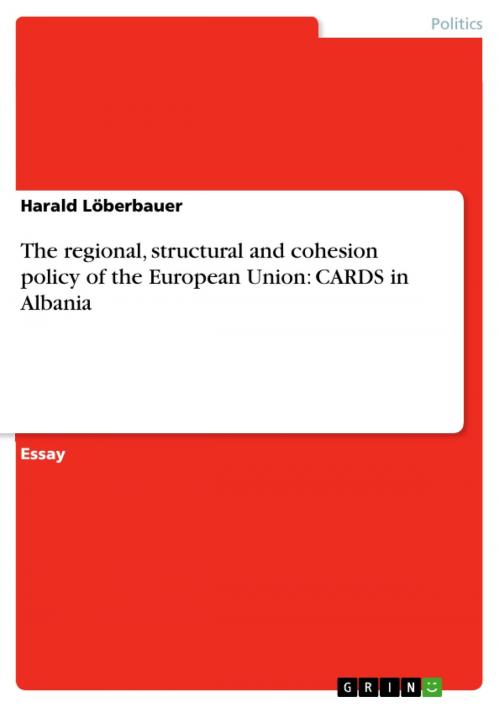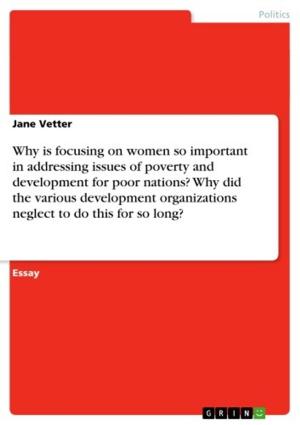The regional, structural and cohesion policy of the European Union: CARDS in Albania
Nonfiction, Social & Cultural Studies, Political Science| Author: | Harald Löberbauer | ISBN: | 9783638527675 |
| Publisher: | GRIN Publishing | Publication: | July 28, 2006 |
| Imprint: | GRIN Publishing | Language: | English |
| Author: | Harald Löberbauer |
| ISBN: | 9783638527675 |
| Publisher: | GRIN Publishing |
| Publication: | July 28, 2006 |
| Imprint: | GRIN Publishing |
| Language: | English |
Essay from the year 2006 in the subject Politics - International Politics - Topic: European Union, grade: 1, Diplomatic Academy of Vienna - School of International Studies (Vienna School of International Studies), course: Regional and Cohesion Policy of the European Union, 12 entries in the bibliography, language: English, abstract: CARDS is an abbreviation and stands for Community Assistance for Reconstruction, Development and Stabilisation. In general there are many assistance programmes for the Balkans and South East Europe. The CARDS programme was established with the Council regulation No 2666/2000 of December 5 in 2000. The overall amount which has been spent by the European Union till the starting process with the Stabilisation and Association Process (SAP) was about 6.8 billion euros by the end of 2005. A key factor in the external relations of the EU is to promote stability, democratisation and peace to non EU member states such as Europeans neighbours. The European neighbourhood policy is an example for the co-operation between the EU and the neighbours of the Union. Therefore in European Union law a debate is going on that the EU needs to have a legal personality. The EU needs to have legal personality in the future because the EU has internal policies that could only be fulfilled with external measures or policies. The status right now is that only the EC has treaty making competences. Those competences at the status quo are rather limited. Art. 24 of the EU Treaty (Nice) allows the EU to establish Agreements which are binding on the member states and the institutions of the Union. Such Agreements are for example the European 'new' neighbourhood policy, Agreements for pre-accession or Agreements with the so-called ACP countries (African, Caribbean and Pacific countries). The Western Balkan falls into the category of the Accession Agreements, which means the goal is the accession to the European Union and the transformation of the legal system(s) according to the acquis communautaire.
Essay from the year 2006 in the subject Politics - International Politics - Topic: European Union, grade: 1, Diplomatic Academy of Vienna - School of International Studies (Vienna School of International Studies), course: Regional and Cohesion Policy of the European Union, 12 entries in the bibliography, language: English, abstract: CARDS is an abbreviation and stands for Community Assistance for Reconstruction, Development and Stabilisation. In general there are many assistance programmes for the Balkans and South East Europe. The CARDS programme was established with the Council regulation No 2666/2000 of December 5 in 2000. The overall amount which has been spent by the European Union till the starting process with the Stabilisation and Association Process (SAP) was about 6.8 billion euros by the end of 2005. A key factor in the external relations of the EU is to promote stability, democratisation and peace to non EU member states such as Europeans neighbours. The European neighbourhood policy is an example for the co-operation between the EU and the neighbours of the Union. Therefore in European Union law a debate is going on that the EU needs to have a legal personality. The EU needs to have legal personality in the future because the EU has internal policies that could only be fulfilled with external measures or policies. The status right now is that only the EC has treaty making competences. Those competences at the status quo are rather limited. Art. 24 of the EU Treaty (Nice) allows the EU to establish Agreements which are binding on the member states and the institutions of the Union. Such Agreements are for example the European 'new' neighbourhood policy, Agreements for pre-accession or Agreements with the so-called ACP countries (African, Caribbean and Pacific countries). The Western Balkan falls into the category of the Accession Agreements, which means the goal is the accession to the European Union and the transformation of the legal system(s) according to the acquis communautaire.















